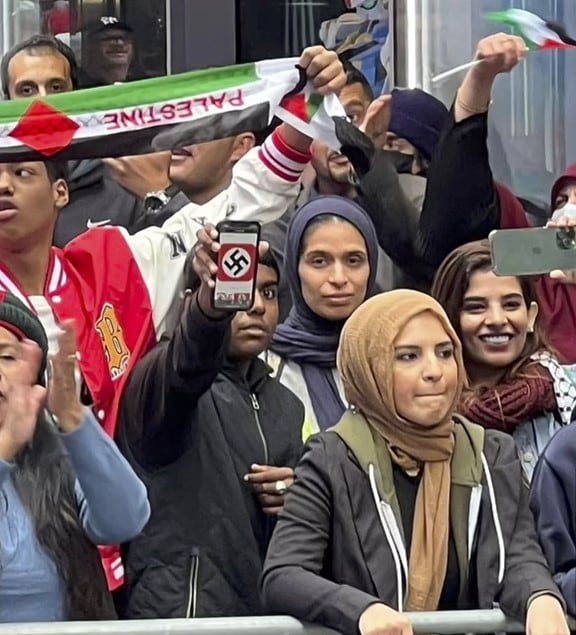Wars have a way of beginning as one thing and ending as another. The American Civil War began to preserve the Union and ended in eliminating slavery. The First World War began over Serbia and ended as the "War To End All Wars." The Second World War began as Poland's allies in France and Britain being compelled to respond to a Nazi invasion. It ended with the United Nations and a new world order.

Whatever the war begun by Hamas against Israel on October 7, 2023 was, it does not mean it will end that way. The brutal initial blow, meticulously planned to be sure, was a massive "success" for Hamas in terms of the sheer slaughter of Israelis and the damage inflicted on Israel in such a short time span. The last time so many Jews died in one day would go back to 1945.
So, if the war was to end today, it would be a stunning, unprecedented victory for the Palestinian terrorist group and its patrons in Iran, Turkey, and Qatar. But war did not end on September 12, 2001, or December 8, 1941. If it ended now, there would be no need whatsoever for Hezbollah or Iran to intervene directly or to do more than what they have already accomplished. The deed was done and the gains secured. The consequences of such a scenario would be massive.
The question is not so much what happens immediately but what happens later. As Israel responds and retaliates to this deadly operation, the murmurs will eventually start in the West: Israel is too harsh, this is not proportionate, enough is enough, think of the children, etc. What seemed like rock-solid support will weaken. This narrative will sound jarring to some having seen the Biden Administration assure Ukraine that it will support it as long as needed against a massive nuclear power in Russia. The same West that was silent for nine months as Armenian Christians in Karabakh were starved by Azerbaijan have already begun to complain about Israel cutting off electricity, food, and fuel to Hamas-ruled Gaza. Initial solidarity with Israel is strong but sooner or later pressure will be exerted on Israel to stop its retaliation. Hamas and the Palestinians have a much larger and more influential crowd of sympathizers than those forlorn Karabakh Armenians.
But while the steps and reactions in the West are very predictable, what happens in the East is less so. Iran has achieved a great initial victory through one of its (several) proxies but how valuable is it to preserve the viability of that proxy? While all of Iran's public narrative in the region and against Israel is tied up with the Cause of Palestine and the "Axis of Resistance," how valuable will it be to preserve the Hamas Card from destruction? Of course, proxies are, by their very nature, disposable but Iran and, to a lesser extent, Turkey and Qatar, have invested a lot in the Hamas project.
If – God forbid – Israel does poorly in the upcoming campaign against Hamas, if it is somehow stymied by stiff Hamas resistance in densely populated urban Gaza or if it is immobilized by a lengthy hostage crisis, then Hezbollah and Iran will do nothing because the victory has been assured and the damage is done. The prestige or awe of the state of Israel, what Arabs call Haybat Al-Dawlah, will have been fatally punctured.
The more successful the Israeli operation against Hamas, the more complete it seems to be to the outside world, the greater the possibility of Hamas rule coming to an end, the more likely the chance that Iran and Hezbollah will escalate. Such an escalation will, at least initially, not involve Iran directly at all but would be led by Iran's surrogates in Lebanon, Syria, Iraq, and even Yemen. Of course, this will all be directed by Iran but an effort will be made to try to keep the parameters of the conflict limited to between Israel and Iran's many cutouts.
Hezbollah hegemony in Lebanon is relatively unpopular (especially among the non-Shia majority – Christians, Sunni Muslims, and Druze) but, of course, the group is even stronger, better armed and battle hardened, than Hamas. According to the pro-Hezbollah daily Al-Akhbar, Hezbollah and Hamas have had a joint operations center in Beirut since at least 2021. It is likely that the initial war has been run to some extent from Lebanese soil since the beginning.
Because I expect Israel to be successful against Hamas in Gaza, indeed it must do so to restore the strength of its deterrence, I do expect that – at the very least – a wider conflict involving several or all of Iran's militia/terrorist proxies will take place. How far it will go once it starts is unpredictable. It is quite likely that Washington will do all it can to prevent Hezbollah and Iran from entering the war. Indirect messages are already being sent. The Biden Administration has been nothing if not deeply solicitous toward both Iran and its main Lebanese proxy since day one in 2021, continuing a pattern started under President Obama. And a broader war would be deeply embarrassing to an American government that has repeatedly tried to play down the importance of the Middle East.
But whatever the Western pressure will eventually be, it is likely not going to be enough to stop Israel to put its own survival first by aiming forcefully at an end state intended to produce, at least, a demilitarized Gaza if not the total end of Hamas rule in that unhappy plot of land.
*Ambassador Alberto M. Fernandez is Vice President of MEMRI.





